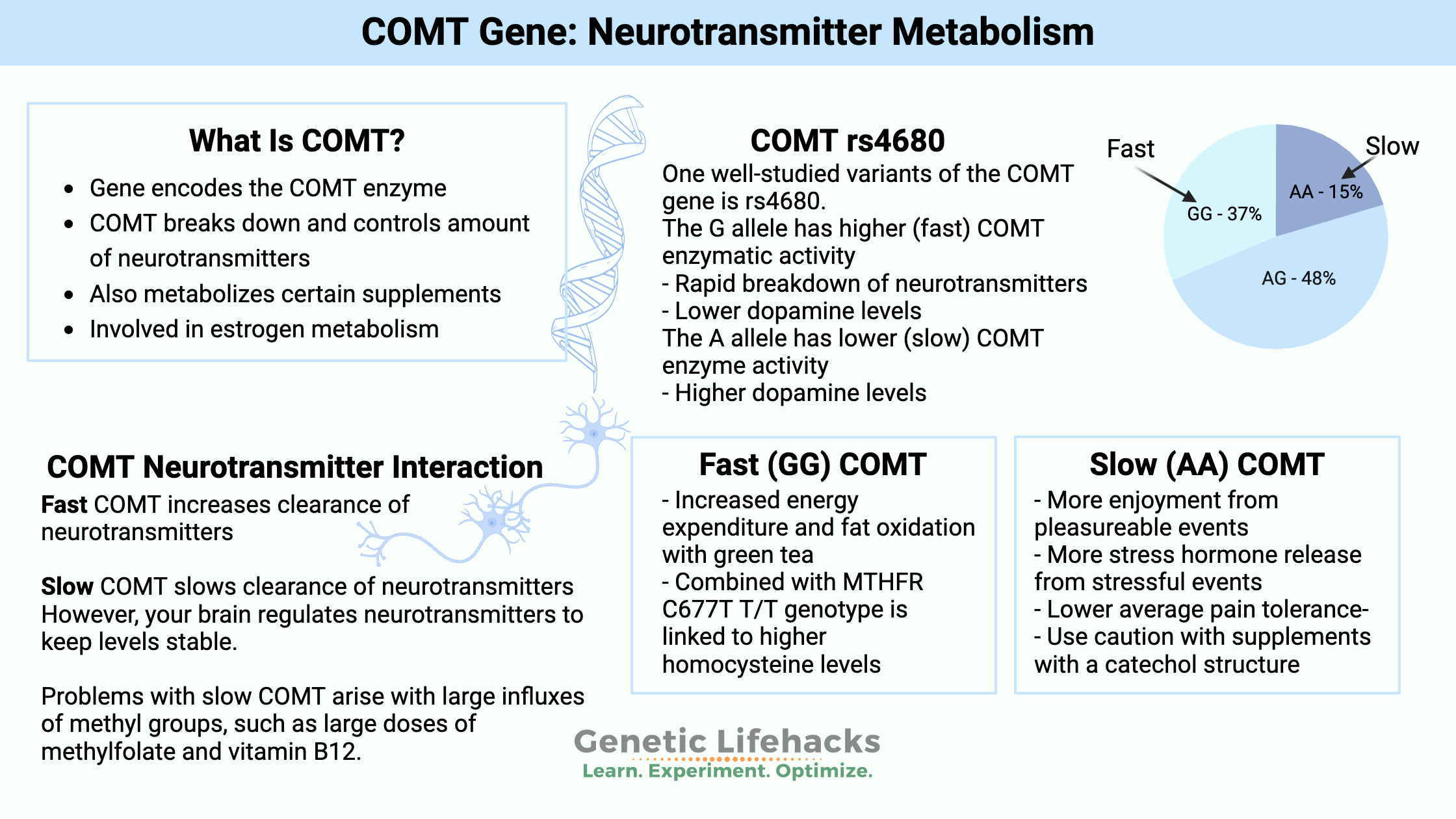Key takeaways:
~ The COMT gene encodes a key enzyme for regulating neurotransmitter levels.
~ Common genetic variants in the COMT gene affect the speed at which the enzyme works.
~ People with fast COMT variants break down neurotransmitters more quickly, while slow COMT increases neurotransmitter levels. These genetic differences can impact attention to detail, working memory, and reaction to stress.
This article explains the role of the COMT gene in neurotransmitter balance, its effect on estrogen metabolism, and how genetic variations can affect your health. I’ll explain how to check your genetic data for COMT fast and slow polymorphisms in your 23andMe, AncestryDNA, or similar raw genetic data file.
What does the COMT gene do?
Do you have side effects, such as irritability, with supplements that contain methyl groups? Wondering why your neurotransmitters seem out of whack? It could be because of your COMT gene variants.
The COMT gene codes for the catechol-O-methyltransferase enzyme, which breaks down (metabolizes) the neurotransmitters dopamine, epinephrine, and norepinephrine. It controls the amount of neurotransmitters available.
COMT adds a methyl group from SAMe to the dopamine, epinephrine, or norepinephrine molecules. This addition of a methyl group changes the original molecule into a different substance that can be eliminated or recycled in the cells.
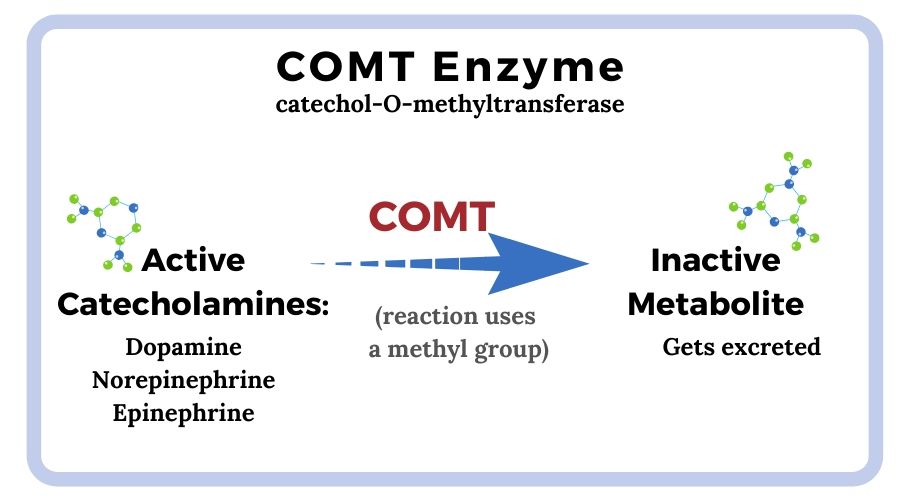
COMT is also involved in the metabolism of estrogen metabolites and certain flavonoids that are commonly used as dietary supplements.
Breaking down supplements and medications:
Medications can also be metabolized by COMT. It breaks down certain drugs used for asthma, Parkinson’s, quitting smoking, and high blood pressure. It is also involved in metabolizing natural supplements like curcumin and quercetin. Genetic variants that impact the function of COMT can change how the medication works for an individual.
Here are a couple of examples (more in the Lifehacks section):[ref]
- Research shows that certain medications, such as bupropion for smoking cessation, may work better in people with slower COMT function.
- THC in cannabis is more likely to impair cognitive function in people with faster COMT function.
Estrogen metabolites:
Additionally, COMT is important in the phase II metabolism of estrogens. COMT converts certain estrogen metabolites into a form that can be excreted easily. This is important because some estrogen metabolites are detrimental and can promote cancerous changes.
Since it also breaks down estrogens, there are differences in the amount of COMT available in the prefrontal cortex between males and females after puberty.[ref][ref] Higher levels of estrogen can decrease COMT, leading to an increase in dopamine in female brains.[ref]
Related article: Estrogen: How it is created and how we get rid of it
Soluble and Membrane-bound COMT:
The COMT gene is located on chromosome 22 and encodes both a soluble form and a membrane-bound form of the enzyme. The soluble form of the COMT enzyme is found throughout the body with high levels in the adrenal glands, liver, lungs, bladder, ovaries, and placenta. The membrane-bound form of COMT is mainly expressed in the brain and affects neurotransmitter levels.[ref]
The soluble form of the COMT enzyme is involved in detoxifying the catechol estrogen metabolites which can cause DNA damage. This is protective against the formation of breast cancer due to DNA mutations. Moreover, soluble COMT also helps to suppress metastasis in ER-dependent breast cancer by suppressing cell invasion.[ref]
Why is this distinction important?
Researchers are looking at ways of altering just the membrane-bound COMT in order to affect neurotransmitter metabolism without affecting the soluble COMT found throughout the body.[ref] This could reduce the risk of cancer when targeting COMT with medications.
COMT Variants Affect Neurotransmitter Levels
Several common genetic changes in the COMT gene alter how the enzyme functions. Variants can increase the speed at which the enzyme metabolizes neurotransmitters, or they can slow down the enzyme’s function.
Let’s look at how this affects the brain:
If a neurotransmitter is broken down faster there is less of it available in the synapse of the neuron. If a neurotransmitter is broken down more slowly, more of it is available in the synapse.
Dopamine is one neurotransmitter with a catechol structure that is metabolized (broken down) by COMT. However, this doesn’t necessarily mean that someone with slow COMT has more dopamine throughout the whole brain. In addition to COMT, dopamine can also be metabolized by MAOA and levels are regulated by dopamine reuptake. In the striatum and nucleus accumbens (brain regions), dopamine is mainly regulated by other means and not by COMT. However, in the prefrontal cortex, dopamine is mainly controlled by COMT. The prefrontal cortex is the brain region involved in working memory, attention, personality, planning, and speech. [ref]
Related article: Dopamine Genes
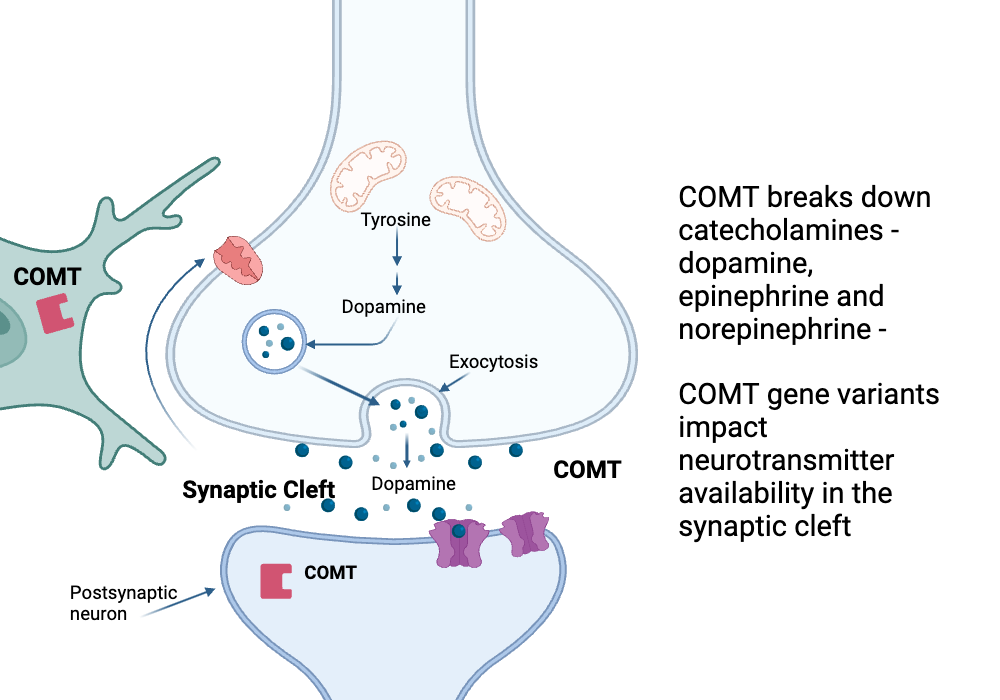
While you may be thinking that more neurotransmitters would be good, there are tradeoffs here. Without sufficient breakdown and elimination of the neurotransmitters, they can accumulate and generate free radicals, which can damage the neuron or cause DNA damage.[ref] Unbalanced neurotransmitter levels are also associated with psychiatric disorders, such as schizophrenia.[ref]
Researchers link COMT genetic variants to quite a variety of different diseases, from mood disorders to heart disease, at least partly due to the COMT variants metabolizing neurotransmitters at different rates.
Norepinephrine and epinephrine are neurotransmitters involved in the flight-or-fight response, heart rate, muscle contractions, blood glucose levels, and respiratory rate.[ref] People with slow COMT are more likely to have longer-lasting effects from stressful events with higher cortisol levels.[ref]
COMT variants can also affect how much pain is felt in chronic pain conditions. Here’s an in-depth article on COMT and Pain Disorders if you want to know more.
Psychiatric or mood disorders and COMT SNPs:
Some of the psychiatric disorders with increased risk associated with COMT genetic variants include:
The COMT variants do not cause these disorders alone. They simply add to the susceptibility to mood disorders along with other genetic variants plus environmental factors. For example, research shows that slow COMT is likely to have more of an effect on brain function when the dopamine system is challenged.[ref] When the dopamine system isn’t under stress, the lower levels of COMT enzyme are kept in balance with the amount of dopamine released.
Related articles: Schizophrenia genes | Anxiety genes | Bipolar disorder
COMT Val158Met polymorphism: Is it all bad?
One of the well-studied COMT genetic variants is known as Val1158Met or rs4680. This variant affects the speed at which the enzyme functions.
The rs4680 A/A (met/met) variant is the slow version and is found in almost 20% of the population. The A/A variant causes the enzyme to be less stable and to break down more quickly at normal body temperature.[ref]
The slightly more common G/G (val/val) variant occurs in 35-40% of the population and is often referred to as fast COMT.[ref]
People with the A/G genotype have intermediate enzyme function — in between the slow and fast COMT function.
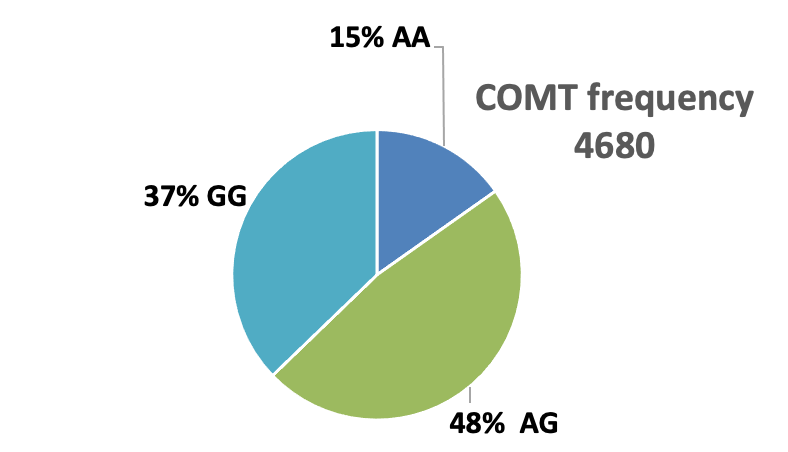
There is a lot written online about COMT – from Facebook groups to healthcare gurus selling supplements.
Often the information leads you to believe that carrying one of the other COMT rs4860 alleles is “bad!” This simply isn’t true. Research shows there are both positive and negative effects of the variant.
Studies show these common variants add to our uniqueness. Instead of focusing on the negatives, look at the interactions between your genotype and supplements or lifestyle factors and use the information to optimize your health – mental and physical.
An overall picture emerges from research of how the slow and fast COMT enzyme affects the way people’s brains tend to work. Here’s what research studies show: [ref]
Slow COMT (met/met):
- better performance on attention-related tasks
- enhanced working memory
- more sensitive to stressful events, higher cortisol (children, teens)
- more likely to avoid harm (less novelty seeking)
- increased relative risk of OCD, panic disorder, pain disorders
Fast COMT (val/val):
- less cognitive decline in aging
- less sensitive to stressful events
- better at processing aversive emotional stimuli
- greater extraversion and more novelty-seeking
- increased relative risk of ADHD, substance abuse
The interactions with dopamine for fast or slow COMT depend, in part, on whether your brain is under stress (thinking, emotion, physical stress). Tonic dopamine is the sustained, normal level and phasic dopamine is the quick increase in response to a stimulus.
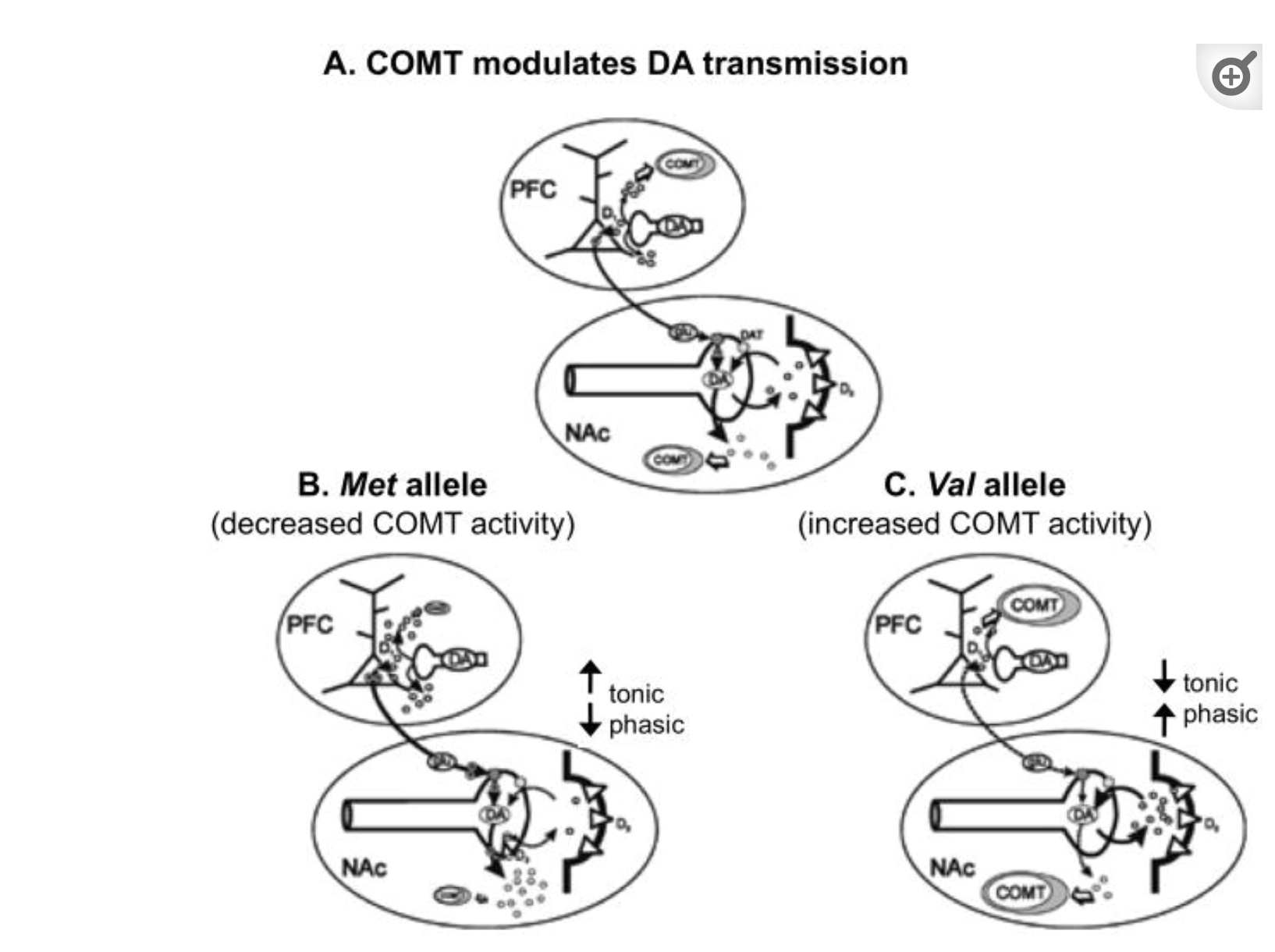
Let’s take a look at what your genetic data shows for COMT….
COMT Genotype Report
Access this content:
An active subscription is required to access this content.
Lifehacks:
While the different versions of the COMT gene have both pros and cons, understanding the interactions with supplements and lifestyle factors can help you emphasize the positives and mitigate any negatives.
Methyl Donor Supplements:
Clinicians often suggest that individuals with the rs4680 A/A genotype (slow COMT) avoid going overboard with foods and supplements considered methyl donors. Methyl donor supplements include methylcobalamin (methyl-B12), TMG, SAMe, theanine, methylfolate, and choline.[ref] The COMT enzyme utilized methyl groups in breaking down neurotransmitters. Overwhelming the pathway with a sudden influx of methyl groups can lead to a rise and subsequent fall in dopamine levels — causing mood swings, anger, irritability, or anxiety.
Related article that goes in-depth on supplements: Supplement Interactions and COMT
Supplements and cofactors:
Magnesium supplement with slow COMT:
Magnesium is a cofactor that is needed for the COMT enzyme to work properly. One study found positive effects for liver COMT levels along with better heart health from supplementing with magnesium.[ref]
A high-quality magnesium supplement may be worth considering if you aren’t getting enough magnesium from food sources.
Related article: Magnesium Deficiency and Your Genes
Which type of B12 works best with slow COMT?
Access this content:
An active subscription is required to access this content.
Related Articles and Topics:
Dopamine Receptor SNPs: Addiction, Mood, ADHD, and Schizophrenia
References:
Bastos, Pedro, et al. “Effect of a Natural Mineral-Rich Water on Catechol-O-Methyltransferase Function.” Magnesium Research, vol. 27, no. 3, Sept. 2014, pp. 131–41. PubMed, https://doi.org/10.1684/mrh.2014.0369.
Behbahani, Parisima, et al. “Association Study of Single Nucleotide Polymorphism Rs165599 of COMT Gene, with Schizophrenia and Bipolar Mood Disorder in the South-West of Iran.” Molecular Biology Research Communications, vol. 4, no. 2, June 2015, pp. 67–72. PubMed Central, https://www.ncbi.nlm.nih.gov/pmc/articles/PMC5019293/.
Caspi, Avshalom, et al. “Moderation of the Effect of Adolescent-Onset Cannabis Use on Adult Psychosis by a Functional Polymorphism in the Catechol-O-Methyltransferase Gene: Longitudinal Evidence of a Gene X Environment Interaction.” Biological Psychiatry, vol. 57, no. 10, May 2005, pp. 1117–27. PubMed, https://doi.org/10.1016/j.biopsych.2005.01.026.
Chao, Jian-Kang, et al. “A Gender-Specific COMT Haplotype Contributes to Risk Modulation Rather than Disease Severity of Major Depressive Disorder in a Chinese Population.” Journal of Affective Disorders, vol. 246, Mar. 2019, pp. 376–86. PubMed, https://doi.org/10.1016/j.jad.2018.12.088.
Chen, Jingshan, et al. “Functional Analysis of Genetic Variation in Catechol-O-Methyltransferase (COMT): Effects on MRNA, Protein, and Enzyme Activity in Postmortem Human Brain.” American Journal of Human Genetics, vol. 75, no. 5, Nov. 2004, pp. 807–21. PubMed, https://doi.org/10.1086/425589.
COMT Gene: MedlinePlus Genetics. https://medlineplus.gov/genetics/gene/comt/. Accessed 21 Oct. 2022.
de Castro-Catala, Marta, et al. “COMT-by-Sex Interaction Effect on Psychosis Proneness.” BioMed Research International, vol. 2015, 2015, p. 829237. PubMed Central, https://doi.org/10.1155/2015/829237.
Gruber, Helen E., et al. “A Novel Catechol-O-Methyltransferase Variant Associated with Human Disc Degeneration.” International Journal of Medical Sciences, vol. 11, no. 7, 2014, pp. 748–53. PubMed, https://doi.org/10.7150/ijms.8770.
Hettema, John M., et al. “COMT Contributes to Genetic Susceptibility Shared Among Anxiety Spectrum Phenotypes.” Biological Psychiatry, vol. 64, no. 4, Aug. 2008, pp. 302–10. PubMed Central, https://doi.org/10.1016/j.biopsych.2008.03.014.
Hirata, Hiroshi, et al. “COMT Polymorphisms Affecting Protein Expression Are Risk Factors for Endometrial Cancer.” Molecular Carcinogenesis, vol. 47, no. 10, Oct. 2008, pp. 768–74. PubMed, https://doi.org/10.1002/mc.20432.
Hursel, Rick, et al. “The Role of Catechol-O-Methyl Transferase Val(108/158)Met Polymorphism (Rs4680) in the Effect of Green Tea on Resting Energy Expenditure and Fat Oxidation: A Pilot Study.” PloS One, vol. 9, no. 9, 2014, p. e106220. PubMed, https://doi.org/10.1371/journal.pone.0106220.
Kanasaki, Megumi, et al. “Deficiency in Catechol-o-Methyltransferase Is Linked to a Disruption of Glucose Homeostasis in Mice.” Scientific Reports, vol. 7, no. 1, Aug. 2017, p. 7927. PubMed, https://doi.org/10.1038/s41598-017-08513-w.
Ko, Maung Kyi Chan, et al. “Association of COMT Gene Polymorphisms with Systemic Atherosclerosis in Elderly Japanese.” Journal of Atherosclerosis and Thrombosis, vol. 19, no. 6, 2012, pp. 552–58. PubMed, https://doi.org/10.5551/jat.11254.
Kotyuk, Eszter, et al. “A Genetic Variant (COMT) Coding Dopaminergic Activity Predicts Personality Traits in Healthy Elderly.” Personality and Individual Differences, vol. 82, Aug. 2015, pp. 61–66. PubMed, https://doi.org/10.1016/j.paid.2015.03.012.
Lachman, H. M., et al. “Human Catechol-O-Methyltransferase Pharmacogenetics: Description of a Functional Polymorphism and Its Potential Application to Neuropsychiatric Disorders.” Pharmacogenetics, vol. 6, no. 3, June 1996, pp. 243–50. PubMed, https://doi.org/10.1097/00008571-199606000-00007.
Li, Wanjun, et al. “Pain in Parkinson’s Disease Associated with COMT Gene Polymorphisms.” Behavioural Neurology, vol. 2014, 2014, p. 304203. PubMed, https://doi.org/10.1155/2014/304203.
Morozova, Anna, et al. “Association of Rs4680 COMT, Rs6280 DRD3, and Rs7322347 5HT2A With Clinical Features of Youth-Onset Schizophrenia.” Frontiers in Psychiatry, vol. 10, 2019, p. 830. PubMed, https://doi.org/10.3389/fpsyt.2019.00830.
Nackley, Andrea G., et al. “Low Enzymatic Activity Haplotypes of the Human Catechol-O-Methyltransferase Gene: Enrichment for Marker SNPs.” PLoS ONE, vol. 4, no. 4, Apr. 2009, p. e5237. PubMed Central, https://doi.org/10.1371/journal.pone.0005237.
Omair, Ahmad, et al. “Genetic Contribution of Catechol-O-Methyltransferase Variants in Treatment Outcome of Low Back Pain: A Prospective Genetic Association Study.” BMC Musculoskeletal Disorders, vol. 13, May 2012, p. 76. PubMed Central, https://doi.org/10.1186/1471-2474-13-76.
Sagud, Marina, et al. “Haplotypic and Genotypic Association of Catechol-O-Methyltransferase Rs4680 and Rs4818 Polymorphisms and Treatment Resistance in Schizophrenia.” Frontiers in Pharmacology, vol. 9, July 2018, p. 705. PubMed Central, https://doi.org/10.3389/fphar.2018.00705.
Sannino, S., et al. “Adolescence Is the Starting Point of Sex-Dichotomous COMT Genetic Effects.” Translational Psychiatry, vol. 7, no. 5, May 2017, p. e1141. PubMed Central, https://doi.org/10.1038/tp.2017.109.
Shorter, Kimberly R., et al. “Consequences of Dietary Methyl Donor Supplements: Is More Always Better?” Progress in Biophysics and Molecular Biology, vol. 118, no. 1, July 2015, pp. 14–20. ScienceDirect, https://doi.org/10.1016/j.pbiomolbio.2015.03.007.
Tan, E. C., et al. “Common Variants of Catechol-O-Methyltransferase Influence Patient-Controlled Analgesia Usage and Postoperative Pain in Patients Undergoing Total Hysterectomy.” The Pharmacogenomics Journal, vol. 16, no. 2, Apr. 2016, pp. 186–92. PubMed, https://doi.org/10.1038/tpj.2015.33.
Tunbridge, Elizabeth M., et al. “Polymorphisms in the Catechol-O-Methyltransferase (COMT) Gene Influence Plasma Total Homocysteine Levels.” American Journal of Medical Genetics Part B: Neuropsychiatric Genetics, vol. 147B, no. 6, Sept. 2008, pp. 996–99. DOI.org (Crossref), https://doi.org/10.1002/ajmg.b.30700.
van Duursen, Majorie B. M., et al. “Phytochemicals Inhibit Catechol-O-Methyltransferase Activity in Cytosolic Fractions from Healthy Human Mammary Tissues: Implications for Catechol Estrogen-Induced DNA Damage.” Toxicological Sciences: An Official Journal of the Society of Toxicology, vol. 81, no. 2, Oct. 2004, pp. 316–24. PubMed, https://doi.org/10.1093/toxsci/kfh216.
Wang, Liang-Jen, et al. “A Potential Interaction between COMT and MTHFR Genetic Variants in Han Chinese Patients with Bipolar II Disorder.” Scientific Reports, vol. 5, Mar. 2015, p. 8813. PubMed Central, https://doi.org/10.1038/srep08813.
Wichers, Marieke, et al. “The Catechol-O-Methyl Transferase Val158Met Polymorphism and Experience of Reward in the Flow of Daily Life.” Neuropsychopharmacology, vol. 33, no. 13, Dec. 2008, pp. 3030–36. www.nature.com, https://doi.org/10.1038/sj.npp.1301520.
“WikiGenes – Collaborative Publishing.” WikiGenes – Collaborative Publishing, http://www.wikigenes.org/. Accessed 21 Oct. 2022.
Woods, James S., et al. “Genetic Polymorphisms of Catechol-O-Methyltransferase Modify the Neurobehavioral Effects of Mercury in Children.” Journal of Toxicology and Environmental Health. Part a, vol. 77, no. 6, Jan. 2014, pp. 293–312. PubMed Central, https://doi.org/10.1080/15287394.2014.867210.
Xiao, Qin, et al. “Roles of Functional Catechol-O-Methyltransferase Genotypes in Chinese Patients with Parkinson’s Disease.” Translational Neurodegeneration, vol. 6, Apr. 2017, p. 11. PubMed Central, https://doi.org/10.1186/s40035-017-0081-9.

